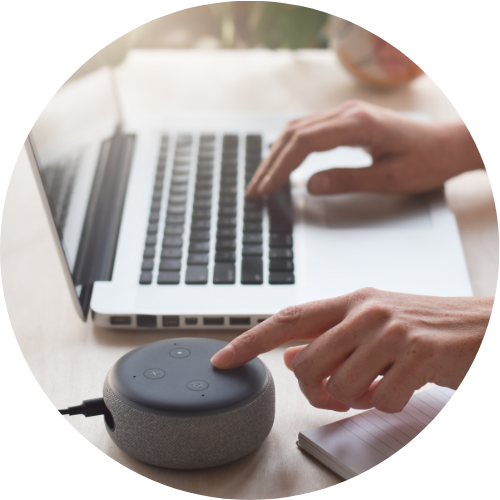Be it your doorbell, thermostat, garage door or even the new coffee maker, your home likely has several devices and appliances that connect to the internet. It may seem like this capability is an added benefit of these items to modernize your space and make your life easier. Although the connectivity provides an added convenience, each device that hooks up to your home’s Wi-Fi can be troublesome and threaten your overall network security.
You’ve probably heard the story of the baby camera that a hacker used to watch and even talk to the people on the other end. That was quite a while ago, but bad actors are still out there and waiting to take advantage of whatever they can.
The refrigerator that sends you pictures of what’s inside while you’re out so you can check on what you need at the grocery store; the washing machine that texts you when the cycle is complete, the Alexa that controls your lights and answers any question you can think of; these devices, if improperly setup, can be a source of problems.
We’ve developed some steps you can take to ensure your home is secure while enjoying the benefits of the latest home technology.
5 Ways to Keep You and Your Home Safe From Cyber Intruders
1. Internet Security
The best place to start is with your internet provider. Make sure their equipment is up-to-date. Sometimes all it takes is a quick call to their support number and they may even send you an updated device.
Most modern internet providers have simple ways to keep your network safe. They can help you by setting up a network that is just for your home and a separate one for guests.
From there, you need to make sure you only connect things to the internet that need to be connected. Just because the toaster can connect to the internet doesn’t mean you should use that feature.
2. Beware of Suspicious Phone Calls
There are many bad actors out there that take advantage of your good nature and try to catch you off guard. Remember, no major company like Apple or Microsoft will ever call you to tell you there is a virus on your machine.
Calls impersonating technology companies or referencing your devices are designed to trick you into allowing them to remotely connect to your machine, then they cause problems that cost you money. The best option is to think twice before following any steps a random caller asks you to perform, and hang up the phone.
3. Secure Your Passwords
Many of us have too many passwords to remember. Sometimes this forces people to reuse passwords or keep them overly simple. Learn The Foolproof Formula To Building A Secure Password.
You can even add two-factor authentication (2FA) to your most important websites. 2FA is a process that adds an extra layer of protection by requiring users to verify themselves through two different pieces of information, typically a password, security token, fingerprint or facial identification. When using passwords, this is commonly performed by sending a code to your mobile device after submitting a correct password. 2FA can keep bad actors from accessing your account if your password is ever compromised, protecting you and your information from disaster.
There are ways to make your passwords more secure and easier to manage. You can read more about this in our post Password Managers for Families.
4. Leverage Software Patches and Endpoint Protection
One of the most basic but also most effective ways to keep yourself secure is to make sure your computer is up-to-date with software patches, which can be automatically downloaded and installed. A significant number of computer breaches you’ve likely heard about were made possible because the systems weren’t updated. Explore these five best practices that increase security when maintaining your software.
Using a good endpoint protection software package will also help keep your information secure. The days of using whatever is built into the machine or a simple antivirus software are gone. Using a more comprehensive endpoint protection software will protect you from web, email and other threats. The newer software can block malicious software even if you mistakenly open it and provides an extra layer of security.
5. Be Mindful On Social Media
If you’re using any social media, limit the information you share. Bad actors often use your personal information to steal your identity. Making your full name, date of birth, your address or other personal details available gives potential identity thieves information they can use against you.
When connecting with people on social platforms, only connect with people you recognize and trust. Unfamiliar accounts may request to connect to communicate with you and gain access to personal information they can use for malicious purposes.
You should also keep information and pictures of friends and family private because bad actors could use this information to manipulate you into taking an action that allows them to commit online fraud.
Stay Secure While Traveling
When traveling, be sure to keep your guard up. Public wireless networks aren’t secure and can grant cyber criminals access to your internet-enabled devices. Hotel business centers, libraries and cyber cafes provide computers for anyone to use, but you can’t trust that these devices are secure. They likely don’t have updated antivirus software or the most recent operating systems and cyber criminals may have the opportunity to compromise these machines. Additionally, there is always a chance that your device could be stolen, putting your sensitive information in the hands of thieves.
Here are some helpful tips to keep in mind before leaving for a trip:
- Update your mobile software and treat your mobile device as if it was your home or work computer.
- Back up your device’s data in the cloud or on another device.
- Lock your mobile device when it’s not in use with strong passwords and PINs.
While you’re away:
- Keep your operating system software and apps updated, which will improve your device’s ability to defend against malware.
- Disable auto-connecting and don’t connect to any wireless that is available. Turn off Bluetooth and remote connectivity so that you only connect to networks when you intend to.
- Ask the hotel concierge what network is safe and only connect to that network. Don’t perform sensitive activities while using a public network as it makes your important information (such as bank accounts or credit card numbers) vulnerable. You’re better off using your mobile network, which tends to be more secure than a public wireless network.
- Be careful what you use a shared computer for in a hotel business office. They can easily have keystroke loggers that will capture every letter you type.
- Be cautious clicking or downloading links you don’t recognize. If you receive emails from unknown sources, delete them. If you need to install an application during your trip, make sure you comprehend the detail completely prior to installing.
- Guard your mobile device and don’t leave it unattended in public spaces. It’s imperative that you keep track of your device especially when being in multiple places while traveling, such as taxis, airports or hotels.
Your mobile device may contain sensitive information that thieves can use to infiltrate your network, so if it’s compromised while travelling, the problem can follow you home and spell out disaster. You want to make sure to follow these best practices while traveling to protect against unwanted threats to your personal information that could negatively impact your home network upon your return.
Key Takeaways
To recap, keep your equipment up-to-date. Whether it’s your internet connection, your laptop or your phone, the security patches and endpoint protection can make all the difference.
Be mindful of your activities on your devices and think before you click. If you feel something is too good to be true or something just isn’t right, trust your instincts. Just because a wireless network may be convenient doesn’t mean that it is secure.
Have heightened awareness of the networks you’re connecting to, especially while traveling, and ensure that they are safe before performing any activities that could make your sensitive information available.
Need Help?
Our Technology Solutions Group includes a team of cyber security experts. We’re happy to meet with you for a free home security scan to help you strengthen the security of your home network. Or, you can contact us online or call 410.685.5512 with any questions.


